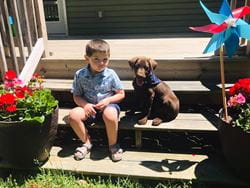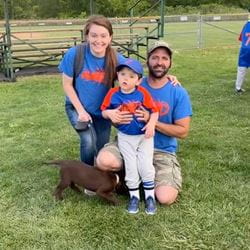Dominic loves his dog Bo. He doesn’t say “mom” or “dad,” but he does say “Bo.” Dominic’s mom Britney Yenzi says that even though Bo is just a puppy and still nips at her and her husband sometimes, he knows to be gentle with Dominic.
Dominic, who will be 5 in August, has a genetic disorder known as MECP2 duplication syndrome. MECP2 is the name of a gene that’s involved in the development of neurologic features. The original condition that was discovered is called Rett syndrome, which for a long time the medical community assumed only affected girls. It’s since been learned that a few hundred males also have a change in that gene, and their condition is called MECP2 duplication syndrome. They have long gone undiagnosed simply because medical professionals did not know the condition was possible.
 Until Dominic was about 6 months old he was reaching his developmental milestones. At around that time his parents started to see some delays, so they sought out Early Intervention. Britney says he would seem to be reaching a new milestone but still be delayed. Then, he had to have a procedure for which he had to be put to sleep. Britney says the anesthesiologist told her there seemed to be something different about Dominic.
Until Dominic was about 6 months old he was reaching his developmental milestones. At around that time his parents started to see some delays, so they sought out Early Intervention. Britney says he would seem to be reaching a new milestone but still be delayed. Then, he had to have a procedure for which he had to be put to sleep. Britney says the anesthesiologist told her there seemed to be something different about Dominic.
“Dominic seemed to zone out, he said. He just needed to tell us that. That was another thing we added to our list.”
At that point the Yenzis, who live in Punxsutawney, Pa., came to UPMC Children’s Hospital of Pittsburgh for genetic testing. Even so, it took two or three rounds of testing for them to get an answer, and Dominic was 2 years old by the time they did. It took so long because the first rounds of testing ruled out more common conditions.
They also learned that Britney is a carrier – with MECP2 duplication syndrome and Rett syndrome, some females are carriers and there is a 50% chance of them passing down the syndromes to their children.
The symptoms of MECP2 duplication syndrome are numerous. These boys can have developmental delays, difficulty meeting motor milestones, intellectual disabilities, limited speech, feeding problems, seizures, recurrent infections, and unfortunately, some boys can also have a shortened lifespan, says Leslie Walsh, a genetic counselor at UPMC Children’s.. She says that treatment is symptomatic; in other words, we know the list of things these children are at risk for so we can expect they may need things like speech therapy, adaptive devices, and seizure medications. Knowing what these boys are up against allows us to intervene as early as we can for the best possible outcomes. Although there isn’t a cure for this condition, the MECP2 community is very active and engaged in research.
 Dominic’s parents try to keep life as normal as possible for him. He walks independently, he goes to HeadStart, and attends both a summer camp and a T-ball league for kids with special needs. But he has a low immune system, so Britney says the past couple of years during COVID have been challenging. “You never know what’s going to happen,” she says. “He can’t tell you. He can’t say my stomach hurts or this hurts.”
Still, the Yenzis are part of a community. There’s an international group on Facebook, MECP2 Duplication Syndrome Family Talk. Britney says that if a family reaches out to her and her husband, that’s the first place they tell them to go.
Dominic’s parents try to keep life as normal as possible for him. He walks independently, he goes to HeadStart, and attends both a summer camp and a T-ball league for kids with special needs. But he has a low immune system, so Britney says the past couple of years during COVID have been challenging. “You never know what’s going to happen,” she says. “He can’t tell you. He can’t say my stomach hurts or this hurts.”
Still, the Yenzis are part of a community. There’s an international group on Facebook, MECP2 Duplication Syndrome Family Talk. Britney says that if a family reaches out to her and her husband, that’s the first place they tell them to go.
The Yenzis try to keep their son’s diagnosis in perspective, Britney says.
“It’s so hard when you get this news. You feel like it’s the end of the world. But we just go with the flow and it’s OK. Try to make sure that everything is an experience as if he didn’t have [MECP2 duplication syndrome]. You keep living, and you’ll be OK.”









